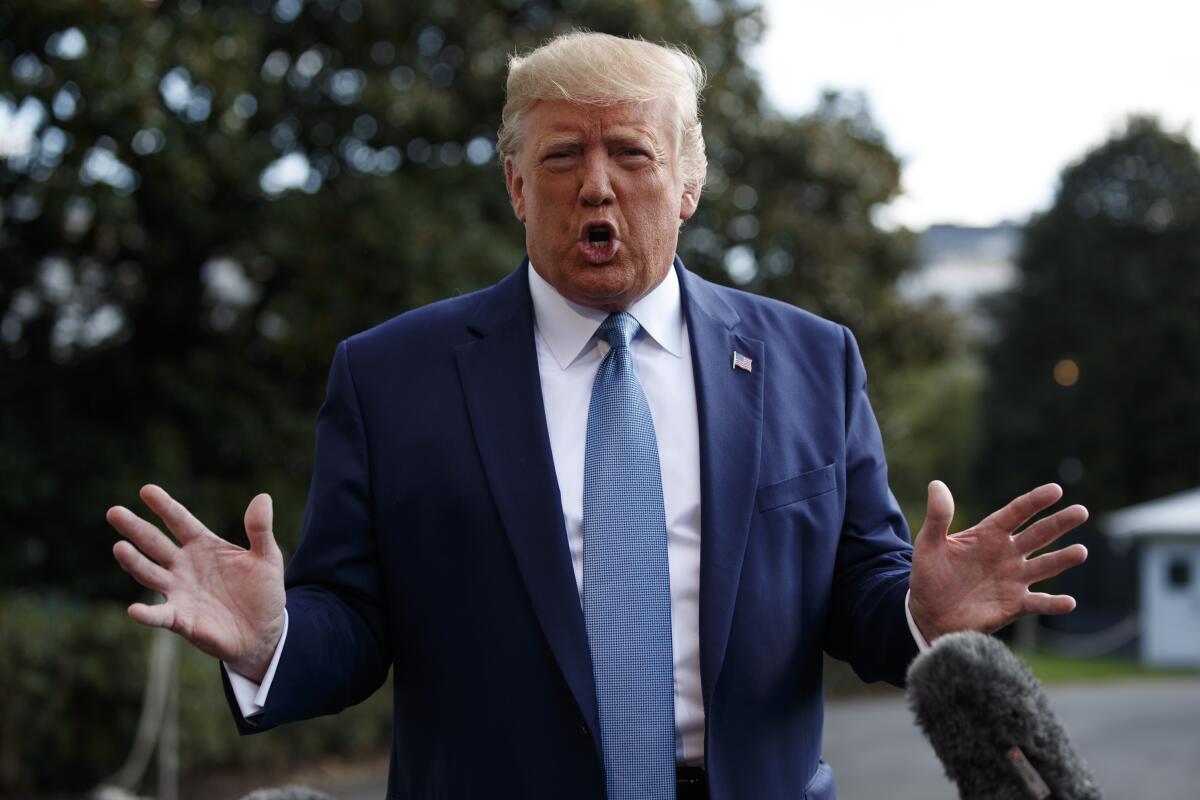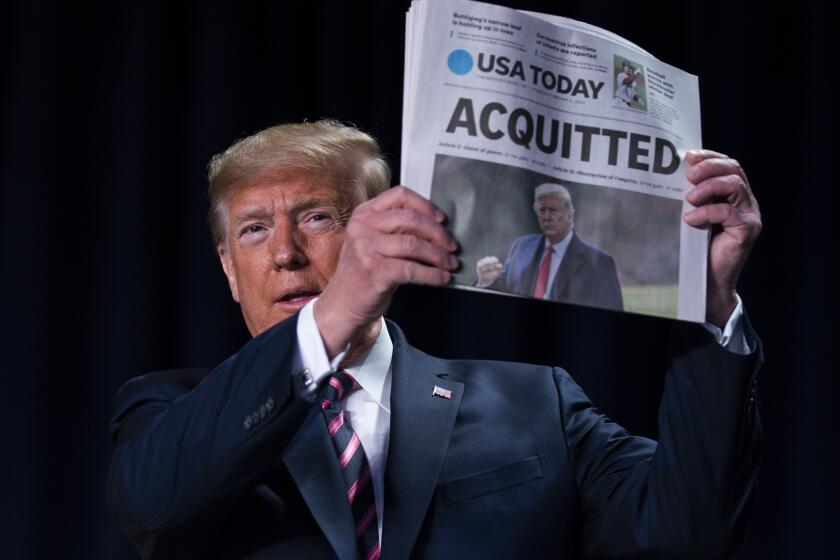News Analysis: Trump cites corruption, not politics, for asking Ukraine to damage Democrats

- Share via
WASHINGTON — As President Trump fights possible impeachment, he has adopted a new argument to defend his demands that Ukrainian authorities find damaging material on Democratic presidential candidate Joe Biden — what he calls his “absolute right” to ask foreign leaders to help root out corruption.
“I don’t care about Biden’s campaign. I care about corruption,” Trump said Friday, one of the 27 times he uttered the word “corruption” in a 23-minute news conference.
Asked whether he had requested that any governments investigate corruption not involving his political opponents, Trump was stumped.
“We’d have to look,” he said.
He cited his zeal to fight corruption after texts from U.S. diplomats appeared to undercut his denials that he wanted Ukraine to furnish dirt on his political enemies in exchange for release of $391 million in U.S. security aid meant to help fight a Russian-backed insurgency.
According to a White House memorandum of a July 25 phone call, Trump asked Ukrainian President Volodymyr Zelensky for “a favor” — an investigation into Biden and into Ukraine’s supposed role in helping Democrats in the 2016 election.
No evidence indicates Biden engaged in any wrongdoing in Ukraine when he was vice president. Nor has any evidence emerged to support right-wing conspiracy theories that Ukraine, not Russia, interfered in the 2016 election.
After angrily refusing at a news conference Wednesday to say what he wanted from Ukraine, Trump decided to go on offense. He said Thursday that he had demanded — and still seeks — an investigation of his political enemy. He went further, publicly urging China to find something too.
To Democrats and numerous nonpartisan observers, it sounded like the president was waving a smoking gun — admitting in public to what they had argued was an impeachable offense, and then taunting them by asking one of America’s adversaries to also get involved in a U.S. election.
The House of Representatives intends to vote to impeach President Trump for abusing his office and obstructing Congress, a condemnation that only two other U.S. presidents have faced in the nation’s 243-year history. Despite the historic nature of the vote on charging the president with committing high crimes and misdemeanors, Trump’s fate has been sealed for days, if not weeks in the Democratic-controlled House.
Some analysts, however, saw Trump’s unexpected defense as clever, one intended to portray a potentially illegal act as cloaked in civic virtue.
“His China statement was, ‘Hey, what’s wrong with rooting out corruption wherever it is?’” said Elaine Kamarck, a fellow in governance studies at the nonpartisan Brookings Institution in Washington.
Given America’s deep partisan divisions, Trump and his allies are betting that enough voters will take the president’s side in a titanic political battle to help him win reelection next year — even if he is impeached by House Democrats.
The coming weeks will test whether Trump’s unconventional behavior and demagogic appeals have created a strong enough shield for him — and Republican lawmakers — to avoid normal political consequences for his efforts to get foreign governments to take down his political enemies.
With polls showing support for the impeachment probe at 51%, a new high, and Trump’s disapproval rate rising, the president has taken to leveling false or unsubstantiated claims at Democrats in an effort to stoke the emotions of partisans on both sides.
He said Biden is “crooked as hell” although investigators in Ukraine say they have no evidence of wrongdoing. He claimed the anonymous whistleblower who first disclosed Trump’s alleged abuses was a “partisan hack,” and repeatedly insulted Rep. Adam B. Schiff, the Burbank Democrat who heads the House Intelligence Committee.
Trump has also revamped an argument that Richard Nixon famously asserted in a TV interview three years after he resigned as president in 1974 to avoid certain impeachment and conviction: If the president does it, it is not illegal.
“Like Nixon, [Trump] understands the public doesn’t like sneakiness,” said Timothy Naftali, a presidential historian. “But he’s making a different bet — that by being open about his actions, he can get the public to accept it. He’s taken a risk that Americans don’t care as much about the character of the president.”
Nixon held himself up as a straight-arrow in public, so that by the time secretly recorded Oval Office tapes were made public in 1974, revealing a dark, profane and scheming tactician, it came as “a huge shock,” said John A. Farrell, a Nixon biographer.
“Nobody had ever expected that the uptight president talked like that in the Oval Office with his cronies,” he said.
Trump, by contrast, spews the same bombast and profanity in public as he does in private.
Whereas Nixon resigned after Republican leaders warned he had lost the party’s support in Congress and would face certain impeachment, Trump may survive thanks to calcified partisanship in Washington.
Only three Republicans in Congress have taken issue publicly with Trump’s brazen claims and his request for China to investigate Biden, most notably Sen. Mitt Romney of Utah, the GOP’s presidential nominee in 2012.
“When the only American citizen President Trump singles out for China’s investigation is his political opponent in the midst of the Democratic nomination process, it strains credulity to suggest that it is anything other than politically motivated,” Romney tweeted Friday.
Trump fired back on Saturday, calling Romney “a pompous ‘ass’ who has been fighting me from the beginning.”
Trump is “counting on people seeing this as a partisan matter, relitigating an election that he won fair and square, rather than a challenge to the principles of the Constitution,” said Alexander Vershbow, a former U.S. ambassador to Russia and the North Atlantic Treaty Organization. “The sheer partisanship of our politics makes it so that he might succeed.”
Vershbow said Ukraine is desperate to counter Russian aggression and is dependent not only on U.S. assistance — which Trump released on Sept. 12 after blocking it for months — but also on the perception in Russia that America is standing as a strong Ukrainian ally.
He said U.S. diplomats and senior Ukrainian officials were “very alarmed” at a conference he attended last month in Kyiv.
The Ukrainians “were completely freaking out about how they could avoid getting completely sucked into U.S. domestic politics and how they could shift the focus back to the legitimate agenda and no one could tell them what to do.”
Times staff writer Sarah D. Wire in Washington contributed to this report.
More to Read
Get the L.A. Times Politics newsletter
Deeply reported insights into legislation, politics and policy from Sacramento, Washington and beyond. In your inbox three times per week.
You may occasionally receive promotional content from the Los Angeles Times.













